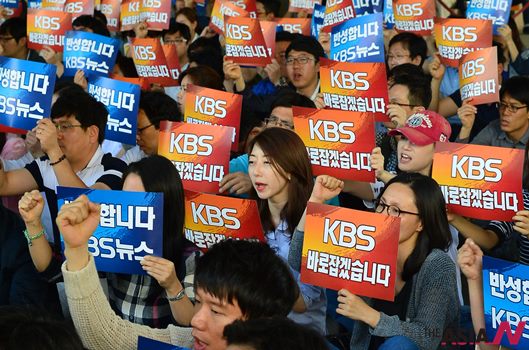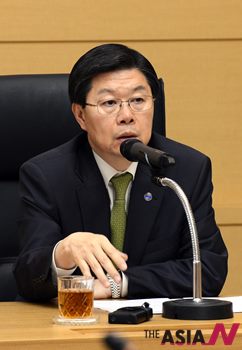
Can KBS be free from Chong Wa Dae?
KBS employees demanding boss’s resignation
Hundreds of the Korean Broadcasting System(KBS) reporters, editors and producers started boycotting their work starting May 19, after a voting result was released supporting the boycott. Amid an abnormal state of broadcasting by the KBS, its employees demanded resignation of their president Gil Hwan-young, alleging that Gil played the stooge for the Presidential Office(Chong Wa Dae).

Confronted with a massive revolt against him, Gil refused to step down denying “he was a stooge for Chong Wa Dae.” Predictably, the boycott will likely last until Gil resigns. Seeing both the KBS employees and Gil agree that the KBS should not be controlled by Chong Wa Dae and disagree as to whether Gil accepted Chong Wa Dae’s detailed interference in news reporting, the role of the public broadcaster should be independent and autonomous reporting free from outside influence.
News director Kim Si-gon discloses “Chong Wa Dae’s interference”
The struggle between KBS reporters and producers vis-a-vis KBS president Gil started when Kim Si-gon, then news director of the company, revealed on May 9 that Gil obeyed Chong Wa Dae’s orders in arranging news broadcasting and gave him detailed news orders. Kim resigned after the disclosure, demanding Gil’s resignation simultaneously.
Kim’s disclosure includes Gil’s “directives” such as “Restrain from overly criticizing clumsy rescue efforts by the Maritime Police during the ill-fated ferry Sewol’s sinking incident” “Air President Park’s news within 20 minutes from the start of the airing” “Place the story about investigation of National Intelligence Service underneath(as less important news)” “Presidential spokesman Yoon Chang-joong’s sexual harrassment case should not be aired” and so forth.
Gil refuted Kim’s allegations saying that his words are exaggerated with malice. Gil even said that he did not exert influence over Kim about the news reporting. However, it is widely rumored among KBS employees that Gil inappropriately interfered with personnel management and exerted influence in news reporting. Amid this confrontation, a group of news editors followed Kim’s suit, issuing a statement demanding Gil’s resignation and another group of producers joined in this move, declaring that they would resign from their current posts.
Several of KBS board of directors proposed a vote of no confidence for Gil. A survey conducted by the trade union showed that 97.9% of the KBS workers answered that Gil should step down. The situation appears to be “the whole of KBS going against Gil alone.”

Abnormal broadcasting going on from Monday
With a decision by the Journalists Association of KBS to boycott news production on May 19, viewers cannot watch normal airing of news and programs. Weekday normal 9 pm news broadcasting for around 40 minutes was shortened to less than 20 minutes with double anchor format turning into one anchor. Other dual news anchor programs were also reduced to one news anchor format with shortened news reporting. Slots for news programs are replaced with other entertainment/ culture programs aired before.
On May 21, KBS union 1 and 2 started voting procedures asking members whether or not to support a planned strike. It is very probable that KBS workers will go on a strike in the next week. 24 correspondents working in foreign countries, 30 team leaders at Technology Headquarters, 300 or so local reporters joined the boycott. Labor unionists obstructed Gil’s way to enter his office in the morning of May 19. However, Gil continues to retain his post amid this mounting pressure.
Independent and autonomous KBS beneficial to both sides
President Park Geun-hye repeatedly said that Chong Wa Dae cannot and should not control broadcasters. But this time, it was revealed again that officials at Chong Wa Dae always try to control broadcasters. Some editorials in Korean newspapers say that Chong Wa Dae should disclose the truth concerning efforts to control KBS and take the responsibility for it.
KBS is one of two public broadcasters in Korea. Efforts to control KBS can only undermine its independence and, if affected, it subsequently may lose credibility among audiences. This means bad results for both KBS and Chong Wa Dae. Officials at Chong Wa Dae need to be more far-sighted. Directive from Chong Wa Dae may come from some officials who are over-loyal to Park. We are not sure whether the current development at KBS may lead to a better result or not.
However, it is certain that independent and autonomous news coverage implemented by KBS can win support from the people and can be a result coming from Chong Wa Dae’s assurance of autonomy for this news organization. Under this circumstance, KBS can play the role to ensure a public sphere for democratic debates, which is beneficial to both KBS and Chong Wa Dae. Whether or not KBS can maintain its independence and enjoy popular support afterwards depends only on Chong Wa Dae.



